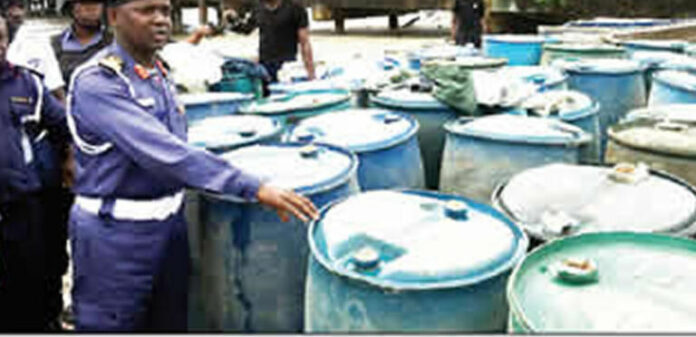Oil Theft Slumps 58.3% in Q1 Amid Renewed Fight against Sabotage
CHIGOZIE AMADI
The theft of Nigeria’s crude oil fell by a whopping 58.3 per cent in the first quarter of 2025, amid the federal government’s reinforcement of initiatives geared towards ending the menace in the country’s Niger Delta.
Data gleaned from the Nigerian Upstream Petroleum Regulatory Commission (NUPRC) during a presentation to the Investment Monitoring Committee of the Revenue Mobilisation Allocation and Fiscal Commission (RMAFC) in Abuja, showed that whereas the theft figure was 12,000 barrels per day in the last 24 months, in Q1, the number fell to 5,000 bpd.
It further confirmed that oil theft averaged 108,000 bpd in Q1, 2022 resulting in the shutdown of a number of trunk lines, and serious disruption to crude production and export.
Before now, Nigeria’s oil theft and sabotage challenges in the Niger Delta had reached alarming levels, severely undermining the country’s oil production and economic stability. For years, illegal bunkering, pipeline vandalism, and unauthorised tapping of crude oil pipelines were rampant across the region.
These activities were often carried out by well-organised syndicates with access to advanced equipment and insider information. The situation was exacerbated by weak oversight, corruption within security agencies, and the absence of strong community engagement. Many local youths, driven by poverty and unemployment, participated in or supported oil theft as a means of survival.
The period saw daily losses estimated at as much as 300,000 bpd, costing Nigeria billions of dollars annually, coupled with the attendant environmental consequences, which were also devastating. The oil spills from vandalised pipelines polluted farmlands, rivers, and mangroves.
But in recent times, Nigeria has taken multiple steps to tackle oil theft, focusing on security, regulation, and stakeholder collaboration. The government has deployed military forces and established joint security operations to patrol key oil-producing areas and protect infrastructure. Surveillance technologies, such as drones and pipeline monitoring systems, have been introduced to detect and deter illegal activities more effectively.
Besides, the NUPRC) has played a central role by enhancing regulatory oversight, improving metering systems, and increasing transparency in production reporting and has mandated the installation of tamper-proof metering infrastructure at wellheads and terminals to track crude oil volumes more accurately.
“Oil theft averaged 108,000 bpd in Q1, 2022 resulting in the shutdown of trunklines , including Trans-Niger Pipeline (TNP), Trans-Forcados Pipeline (TFP), Nembe Creek Trunk Line (NCTL) etc). The production dropped to as low as 1.1 million bpd in September 2022 (loss of circa 600,000 bpd) due to the shutdown of the trunk lines.
“Oil theft has significantly reduced due to the ongoing kinetic and non-kinetic intervention by the government. Oil theft which averaged about 12, 000 bpd in the last 24 months further reduced to 5,000 bpd in the last quarter.
“Whereas the production fluctuated around 1.5 million bpd, the sustained fight against oil theft has resulted in steady increase in production. We are able to restore and sustain the production to 1.7 million bpd. Efforts are ongoing to increase the production by 1mbpd,” slides shared at the event which was not open to the media showed.
Besides, the NUPRC listed the current number of Oil Prospecting Licenses (OPLs) as 15; Petroleum Prospecting Licenses, 73; Oil Mining Licenses, 95; Petroleum Mining Licenses, 55; open blocks, 223 and operating companies at 85.
A breakdown of the companies and facilities showed that 46 companies are producing, while fields in production total 235. Besides, the NUPRC put the total oil production wells at 2,176 and gas wells at 125. In addition, production platforms are currently 188; gas terminals are four, while crude oil terminals are 33.
At the event, THISDAY learnt that the investment monitoring committee of the RMAFC awarded a five star rating to the NUPRC for its performance in revenue generation and the provision of accurate data regarding its regulatory functions.
Chairman of the committee, Ekene Enefe, said the visit was aimed at fostering collaboration and addressing challenges related to revenue generation.
Speaking on behalf of the Commission’s Chief Executive, Gbenga Komolafe, the Executive Commissioner for Economic Regulation and Strategic Planning, Babajide Fashina, elaborated on the NUPRC’s mandate as outlined in the Petroleum Industry Act of 2021.
He noted that the commission was working to ensure that the upstream oil and gas industry operates in line with global best practices, highlighting that the NUPRC was making significant progress through new regulations and policy reforms.























